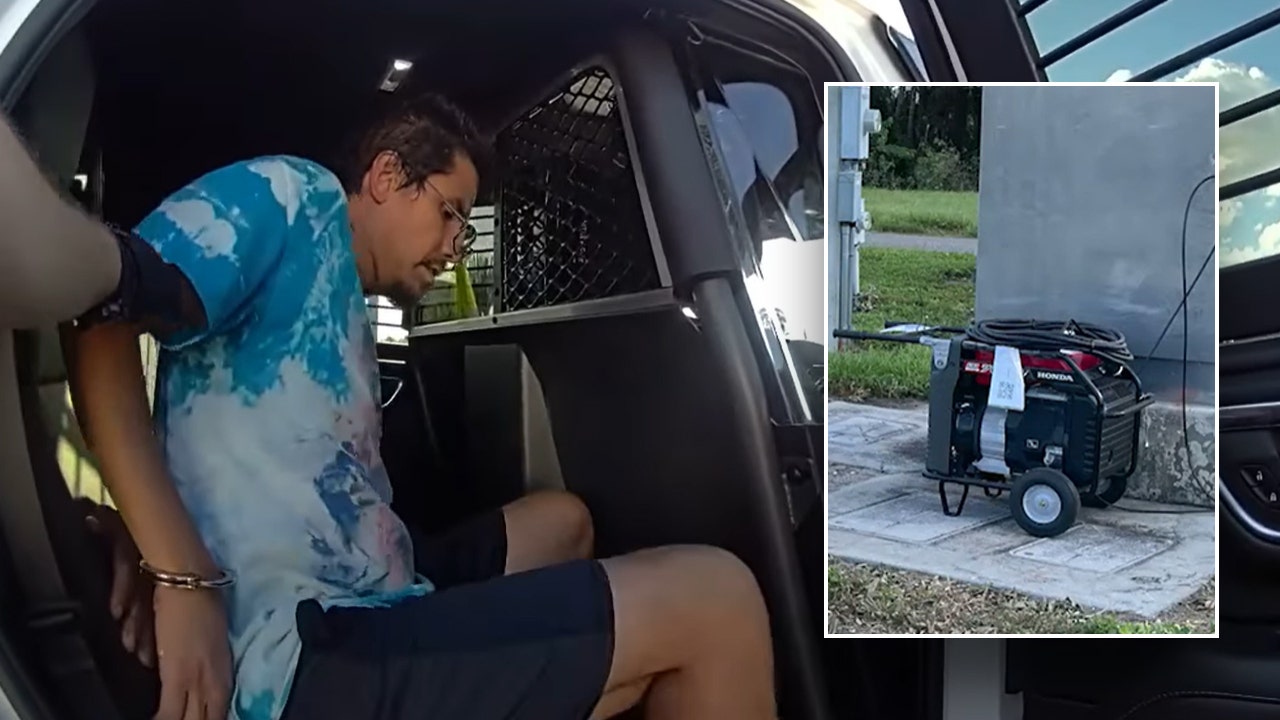The aftermath of Hurricane Milton in Sun City Center, Florida, saw an unexpected incident involving a generator powering a damaged traffic light. This seemingly simple act of infrastructure maintenance became a criminal investigation when a local resident, 40-year-old Soyal Zapata-Dye, allegedly attempted to steal the vital piece of equipment. The incident highlights the vulnerability of essential services following natural disasters and the swift response of law enforcement to protect community resources. The arrest, captured on body camera footage and widely shared on social media, serves as a cautionary tale about the consequences of opportunistic theft, particularly in the immediate aftermath of a devastating event like a hurricane. The case also raises broader questions about the security of temporary infrastructure and the need for effective measures to safeguard critical equipment during emergencies.
The Theft Attempt and the Arrest
The Scene of the Crime
The incident unfolded at the intersection of Sun City Center Boulevard and Stoneham Drive, where a generator was powering a traffic light likely damaged during Hurricane Milton. TECO Energy workers, responsible for maintaining the area’s power grid, witnessed Zapata-Dye attempting to steal the generator. Their quick thinking and decisive action proved crucial in apprehending the suspect. They not only confronted Zapata-Dye but also collected photographic evidence and recorded his license plate number, providing invaluable information to the Hillsborough County Sheriff’s Office. This proactive approach by the TECO workers significantly assisted in the swift resolution of the case.
The Sheriff’s Department Investigation
The Hillsborough County Sheriff’s Office acted swiftly upon receiving the report from TECO Energy. Utilizing the license plate number provided, deputies quickly traced the vehicle to Zapata-Dye’s residence. The arrest was recorded on body camera footage, which vividly captured the events leading to Zapata-Dye’s apprehension. The footage shows deputies approaching Zapata-Dye’s home and ultimately placing him under arrest. Notably, Zapata-Dye’s initial reluctance to cooperate, citing the preparation of dinner, contrasted with his later explanation that he believed the generator was abandoned due to the lack of a lock and identification. This disparity in his actions and statements further contributed to his arrest. The presence of a K-9 unit during the arrest underscored the seriousness of the situation and the determination of law enforcement to recover the stolen equipment.
Zapata-Dye’s Defense and the Charges
The Suspect’s Claim
During the arrest, Zapata-Dye offered an explanation for his actions, claiming he believed the generator had been abandoned because it lacked a lock and any identifying markings. This assertion, however, failed to account for the witnesses who observed his attempt to steal the generator. The lack of a lock and identification does not grant permission to take the property; it simply highlighted a potential security lapse in securing temporary power solutions after the hurricane. This incident underscores the importance of clear marking and secure storage of essential equipment deployed in emergency situations. The failure to adequately secure the generator contributed to the opportunity for theft and highlighted a vulnerability in post-hurricane response plans.
The Legal Ramifications
Zapata-Dye faces charges of third-degree grand theft during a state of emergency, a serious offense with potentially significant penalties. This charge reflects the heightened severity of theft committed amidst a crisis like a hurricane, where essential services are disrupted, and resources are already stretched thin. The “state of emergency” clause adds weight to the charges, reflecting the seriousness of disrupting the restoration efforts following the hurricane. The severity of the charge signifies that the act of theft was not viewed as a simple act of opportunistic property taking but as a criminal act exacerbating the challenges faced by the community recovering from a natural disaster.
Implications and Future Preparedness
Security Concerns Highlighted
This incident highlights critical vulnerabilities in post-disaster infrastructure security. The easily accessible generator, lacking any locks or identifying information, served as an open invitation to theft. Lessons learned from this case emphasize the importance of securing essential equipment during and immediately following natural disasters. Implementing measures such as tamper-proof locks, clear identification, and possibly GPS tracking on valuable equipment could deter theft and expedite the recovery of stolen goods. Such proactive steps are essential to ensure the continued operation of vital services in emergency situations.
Community and Emergency Response
The swift actions of the TECO Energy workers and the Hillsborough County Sheriff’s Office reflect effective collaboration between community stakeholders and law enforcement. The synergy between these groups facilitated the swift identification and arrest of the suspect and underscore the importance of community collaboration in crime prevention and the effective management of resources following a major disaster. This collaborative approach to addressing the aftermath of Hurricane Milton and the subsequent security breach represents a model of cooperation, highlighting the mutual benefits of a well-integrated and reactive emergency response team.
Takeaway Points
- The attempted theft of a generator used to power a traffic light in Sun City Center, Florida, emphasizes the vulnerability of essential infrastructure after natural disasters.
- Soyal Zapata-Dye’s arrest highlights the importance of secure practices for protecting vital equipment deployed in emergencies.
- The case underscores the need for increased security measures to prevent similar thefts in future emergency situations.
- The quick response from TECO Energy workers and the Hillsborough County Sheriff’s Office shows the value of inter-agency collaboration in protecting community assets and ensuring swift resolution.




